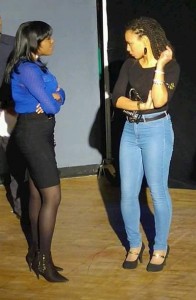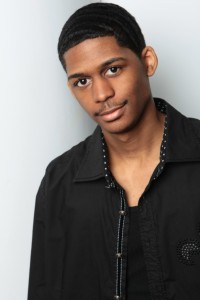Harlem Repertory’s The Wizard of Oz is a theatrical romp accompanied by a lively jazz trio. Directed and choreographed by Keith Lee Grant, themes of self-discovery, connection to family and facing one’s fears are well tackled and performed by a wonderful multicultural cast. They bring to life the events that propel the Kansas schoolgirl, Dorothy, on a magical mystery tour as she follows the yellow brick road.
Nothing But the Truth
Why Not Just Tell the Truth is an ambitious, yet over-reaching, play at The Tato Laviera Theatre. It is extremely current and very raw, with great music selection for a television show. Based on a web series, of the same name, it brought the challenges of the average TV show to the stage; the need for a talented script doctor and a seasoned director. The play desperately wants to be edgy, however what’s missing is an understanding of theatrical character development, voice projection and pacing. The playwright offers 25 separate scenes in three acts, and as he explains before the current rises, the play is in your face; however it lacks the tightness cinema may forgive but the stage demands.
Written, co-directed and produced by Carleton King, who also plays the lead, Why Not Just Tell The Truth is challenged by King assuming too many duties. His character is on stage for most scenes, never allowing him the latitude to tighten the script or deliver deeper, richer characters. As an actor, King’s vision for the role of Jason requires a deeper, spiritual quest (especially as he argues with God). Throw the Bible on the ground but make it matter. The audience is afforded less time with the characters enduring long scene changes that soften the impact of drama
As a teenager, Jason inherited an extremely large sum of money from his parents. He has been married for two years to a woman who verbally taunts him all the while cheating on him. After finally separating, she is physically abused by her new boyfriend, ridiculed by Jason’s new female companion who proclaims herself a “high-powered attorney” and eventually returns to Jason longing for whatever it is she thinks they had. While Jason has no desire to take her back, her new boyfriend, who is unhappy with her departure, exacts his revenge but on the wrong person. Jason’s best friend Tony struggles with the transition from the dating scene to a more serious relationship, having perfected the persona of a player. Jason’s childhood sweetheart-turned-mafia "hybrid princess" is still longing for a relationship with Jason knowing that his wife is not good for him. Tony, returning from the dead to offer Jason advice, comes off as a cliché rather than sage closure for the character.
The young actors, who anxiously want to do a respectable job delivering every line, lacked exciting direction with a script that includes a lot of story but provides little room for character nuance. Rarely does co-directing enhance the result and in this case merely muddies the result. Why Not Just Tell The Truth is co-directed by Melissa Diaz. Repeatedly, dialogue is swallowed making scenes difficult to understand, and in almost in every scene someone is outside of the pool of light. The lighting technician, Hector Orta, chose not to light stage right but rather use a wide follow spot. A more seasoned director would have caused the actors to deliver more than just basic emotions, while addressing the most important need of an audience—the desire to care.
The Tato Laviera Theatre is a great space with stadium seating, a large stage to work with and an awesome light board. The main set includes a sofa, end table and a Queen Anne, high back chair, and stage left, which is Tony’s bedroom, has a single bed pushed up against the wall. Stage right starts off empty; however throughout the evening, two chairs and a table are noisily moved on and off set. Since most of the scenes that take place in this part of the stage utilize the table and chairs, it would have been simpler to work around them and light the area appropriately. Additionally, stagehands are too often seen, voices are heard from back stage and lighting, and music cues are missed.
Why Not Just Tell The Truth does not have that luxury of a boom mic or editing room. The musical selections are well chosen for a TV show or movie, but on stage, it fragments the story rather than bring it together. The bones of the play—love, betrayal, revenge and forgiveness—are spoken about but without deeper development of the characters, believability has to be suspended leaving little truth to tell.
Performances of Why Not Just Tell The Truth, produced by Tru Luv Entertainment, run on Friday, Feb. 19 at 5 p.m. and 7:30 p.m. at The Tato Laviera Theatre (240 East 123rd St. between 2nd and 3rd Aves.) in Manhattan. Tickets are $25 and can be purchased by visiting https://www.eventbrite.com/e/why-not-just-tell-the-truth-the-play-tickets-19703885853.
Read our Q&A interview with Carleton King on his inspiration behind Why Not Just Tell The Truth.
Q&A: King Brings Web Series to Theater
Carleton King grew up in Brooklyn, had head shots as an infant and was pushed toward the profession by his parents. Even so, he always knew he had a knack and evolved with the craft by studying acting and theater at St. John's University and Long Island University. After a number of acting credits over the last decade in theater, film and TV, King developed the web series Why Not Just Tell The Truth. With a few thousand subscribers across the globe, King has decided to go Off-Broadway to gauge whether he should add to the 11 episodes already in the can. Either way, coming clean is at the heart of his inspiration.
Carleton King: Honesty is a very deep rooted idea. Most people hate to be lied to but sometimes we even lie to ourselves. This can leave you in a lot of trouble when you’re in denial or being dishonest in interpersonal relationships. So I wanted to explore some of those situations.
OffOffOnline: Taking a look at some of the episodes, I see characters with some heavy weaponry and situations that go on beyond just lying to your girlfriend.
Carleton King: Yes, some of the characters allow certain situations to become bigger than normal life and stem mostly from Tracey (Ana Araújo). Her father was a mafia boss, and her mother comes from a Cuban crime family. That causes her to have this weird dichotomy of a personality, but her friendship with Jason helps drive the plot. So anyone who disrespects him has to worry about her coming after them.
OffOffOnline: Jason is your character. Tell me about him.
Carleton King: He’s a good guy. He believes in love, marriage and making things work. That can work to his detriment because he’ll try to make a bad thing work when he probably just needs to let it go.
OffOffOnline: I guess that includes his marriage.
Carleton King: I’ll just say it. Kathy (Charese Annel) is a bitch. He got his heart broken in college by Janette (Margaret McDuffy and Inayah Burton). She was the one that got away and this left a lingering hole in his heart. Unfortunately, he ends up filling it with the wrong person.
OffOffOnline: Denial—if you will?
Carleton King: Yes… She is evil but hopefully people get to understand what makes her the way she is.
OffOffOnline: She sounds more suited to Tony, the player.
Carleton King: He’s in denial in the sense that he doesn’t want a real relationship or love.
OffOffOnline: Why?
Carleton King: All the characters have their face value and their underlying value. In other words, the things that make them what they are. He’s in denial in the sense that he doesn’t want a real relationship or love.Tony (Patrick Jackson) has all these women, and it’s so easy for him. But why does he chase love like that? We just hope people can come to understand what makes a player a player.
OffOffOnline: How much does Jason relate to your life?
Carleton King: If you know my life, you really wouldn’t get the correlation. But a lot of the situations were inspired by the feelings that these scenes are based on. So if you follow the emotions, then you get the idea where the inspiration comes from.
OffOffOnline: How much is New York City a character?
Carleton King: This play could take place anywhere but it does come into play in the background of the characters. Mariah (Janelle Stein) is a reformed hood girl from the projects. That’s a very specific thing because projects in other cities are not the same. The ethnic mix in New York is also different. So the intermingling in our melting point is inherently different and represents itself in the characters.
OffOffOnline: Are you using the same actors from the series?
Carleton King: Except for me, it’s a whole new cast.
OffOffOnline: What was it like converting from the web to a play?
Carleton King: You don’t have the magic of editing and multiple takes. Then we had to break things down to their basic level and rearrange to fit a more natural order so they flow better.
OffOffOnline: What will be the impact of doing this live?
Carleton King: There’s so many things that I put into the show—it wouldn’t be the same if I tried to record it. The scenes had to be done right there in front of an audience because it’s more of an interactive thing… I’ll just say I plan to raise a few eyebrows.
OffOffOnline: What do you hope people take away?
Carleton King: The truth can be a very powerful thing that shouldn’t be lost in translation, and hopefully people can have the courage to be honest in the first place.
Performances of Why Not Just Tell The Truth run on Friday, Feb. 19 at 5 p.m. and 7:30 p.m. at The Tato Laviera Theatre (240 East 123rd St. between 2nd and 3rd Aves.) in Manhattan. Tickets are $25 and can be purchased by visiting https://www.eventbrite.com/e/why-not-just-tell-the-truth-the-play-tickets-19703885853.










